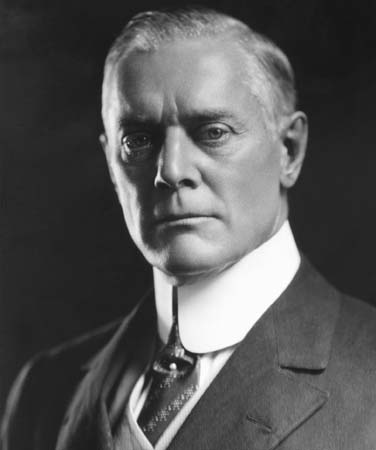Search
Search>> Government>> Politicians>> United States>> Albert J. BeveridgeAlbert Jeremiah Beveridge

Born October 6, 1862 - Died April 27, 1927
Albert Jeremiah Beveridge was an American historian and politician.
Beveridge was born in Highland County, Ohio on October 6th, 1862. Shortly after his birth his parents moved the family to Indiana. He had a childhood of hard work and labor, which may have influenced his later political standings. Around 1881 he attended Indiana Asbury University, now DePauw University. He graduated in 1885 with a Bachelors of Philosophy.
In 1884, Beveridge entered the political world when he started giving speeches on behalf of Presidential candidate James G. Blaine. Many of his speeches from 1884 and beyond were on the subjects of the United States expanding it's territorial holdings and increasing the power of the Federal Government. Until 1896 he worked on several campaigns.
In 1887, Beveridge passed the bar, after working in Indianapolis as a law clerk. He opened a law practice in Indianapolis after being admitted to the bar.
In 1899, Beveridge was elected as United States Senator from Indiana as a Republican. He served two terms in the Senate. He was a big supporter of President Theodore Roosevelt's progressive views. He was also the keynote speaker at the Progressive convention in 1912 nominating Roosevelt for President. He was a big supporter of annexing the Philippines. He also advocated for the construction of a new larger Navy. For many of these reasons he was known as one of the great American imperialists.
In 1901, Beveridge had a meeting with Leo Tolstoy. At the meeting an associate of Beveridge filmed it on a 60mm camera. After, aides for Beveridge succeeded in getting the film destroyed in fear meeting with such a controversial author as Tolstoy could hurt Beveridge's chances in a Presidential run.
Beveridge also championed child labor laws and was the sponsor of the Federal Meat inspection act of 1906. The act was spurred by the release of the serialized story The Jungle which laid bare the truth of the time in regards to immigrants, the hardships they faced and the horrible conditions surrounding the meat packing industry of the early 20th century.
Beveridge lost his Senate seat in the election of 1910. Two years later he followed Theodore Roosevelt when he left the Republican party to form the new and short lived Progressive Party. In part because of his defection from the Republican party, he never held political office again. He never strayed far from the political stage.
In 1923, Beveridge gave a speech in which he repudiated some of his previous stances. Specifically he denounced the expansion of the powers of the federal government. In one notable speech he stated "America would be better off as a country and Americans happier and more prosperous as a people," he suggested, "if half of our Government boards, bureaus and commissions were abolished, hundreds of thousands of our Government officials, agents and employees were discharged and two-thirds of our Government regulations, restrictions and inhibitions were removed."
Later in life Beveridge turned his attention to writing historical biographies. There were two of note. The first was a four volume set titled The Life of John Marshall. For it he won a Pulitzer Prize. He started working on a similar set of books about Abraham Lincoln. He passed away before finishing it. After his passing, two of the four were published.
Beveridge passed away on April 27, 1927.
Beveridge was a member of Oriental Lodge No. 500 Indianapolis, Indiana.